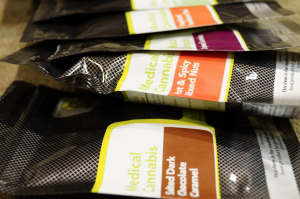Palo Altans decisively defeated a ballot measure that would have allowed for the establishment of three medical marijuana dispensaries in their town. Measure C failed by an almost 2-1 margin, with 38 percent voting in favor and 62 percent opposed.
“I had faith that Palo Alto voters would make the right choice, and I think they did,” Palo Alto Vice Mayor Greg Scharff said by telephone late last night.
Scharff, a strong opponent of the measure, expressed concern last month about crime and loitering should dispensaries be allowed to open in the city. At an Oct. 3 panel hosted by the Peninsula Press at Stanford University, Scharff said that every city council member, as well as a number of former mayors and community leaders, opposed Measure C. He predicted then that the measure would fail by a 65-35 margin.
The Palo Alto vote on medical marijuana came as Colorado and Washington legalized the use of recreational marijuana, becoming the first states in the nation to do so. Three other states — Arkansas, Montana and Massachusetts — voted on medical marijuana related measures. In California, San Diego County cities including Del Mar, Solana Beach, Lemon Grove and Imperial Beach also voted on marijuana related measures.
Measure C asked voters to approve the operation of three medical marijuana dispensaries in Palo Alto subject to certain zoning and operating restrictions. If the measure had passed, the city would have received 4 cents in taxes for every $1 of dispensary sales, along with $10,000 per dispensary permit.
Those potential financial gains for the city didn’t seem to sway many voters outside the polling places yesterday.
One Palo Alto resident, dressed in medical scrubs on her way into the Palo Alto High School voting place, declined to be identified by name but said she was voting against Measure C because of the “demographics’’ dispensaries would attract.
Jason Bau echoed the sentiment saying he was voting against Measure C because it would mean an unwanted influx of people from other places.
Outside Palo Alto High School, the very place she hoped to protect with her vote, resident Tanya Halepota cast her vote against Measure C, she said, because of the problems associated with marijuana addiction among high school students. “I think it would be a negative to have (dispensaries) so close in our community,” she said.

California voters legalized medical marijuana when they passed Proposition 215 in 1996, setting up potential conflicts with federal law, which classifies marijuana as an illegal drug.
Palo Alto banned medical marijuana dispensaries in 1997. The city was obligated to place the issue on this year’s ballot after the necessary 4,356 required signatures were collected.
“Despite historic victories in Colorado and Washington legalizing and regulating marijuana, the voters in Palo Alto have thrown sick, disabled and dying patients under the bus by failing to pass Measure C,” Steve Kubby, one of the key drafters of Proposition 215, said in an email.
Palo Altans voted on the issue at a time when federal agents are cracking down on dispensaries across the country, including where they are legal under state and local law. Seventeen states and the District of Columbia have legalized marijuana, with laws varying by state. None offer protection against federal prosecution.
Soon after President Barack Obama took office, his attorney general, Eric Holder, Jr., stated that federal authorities would target shops that use medical cannabis as a front for drug trafficking. But last year the federal stance shifted and authorities began to crack down on dispensaries more broadly, including landlords who leased space to them.
The federal government has shut down dispensaries in California cities including Los Angeles, Berkeley and San Francisco.
Still, James Anthony, an Oakland-based lawyer who focuses on medical marijuana cases, said that voters around the nation are beginning to support the legalization of marijuana for medical and non-medical uses.
Because of the large number of state and local measures, Anthony said as people headed to the polls yesterday that Palo Alto’s decision was unlikely to impact the legalization movement.
“Palo Alto by itself does not make a trend,” Anthony said in a telephone interview.
Just who spearheaded Measure C remained cloudy. The measure’s backers reported $128,000 in contributions, but no breakdown was provided to election officials.
Even those involved in promoting the measure said they didn’t know who was behind the measure. Little, if any, public campaigning was apparent.
Thomas G. Moore — a Stanford University Hoover Institution senior fellow who, with his wife Cassandra, were among the few identifiable supporters of the ballot measure – argued before the election that alcohol and tobacco were more harmful than cannabis. “Crime is mostly related to liquor stores, and we have them all over the place in Palo Alto,” Moore said at the Peninsula Press panel. “We paid the cost of Prohibition — violence, lots of violence.”
Moore didn’t immediately return phone calls or emails seeking comment on the election results.
Peninsula Press staff writers Sasha Arijanto, Ketaki Shriram and Natasha von Kaeppler contributed to this report.
